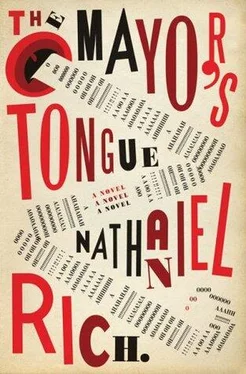And Mr. Schmitz has to tell him about his trip to Italy, and the funeral that preceded it, and the long months of nighttime visits to the hospital and cereal dinners and catatonic walks through the midsummer swelter around Central Park's Harlem Meer, during which, in his mindless state, he sometimes dropped his cigarette and broke into a sprint.
But most of all, he has to tell Rutherford about Agnes. Now that she's gone, he can discuss with his friend her irrational anxieties and fears. He can explain how, though there was little tenderness between them most of the day, there was a stretch of night — from about midnight until five in the morning — in which she became a different person altogether. Rutherford never saw this side of her. During these hours she would weep or laugh loudly while writing in a small blue leather journal. Mr. Schmitz couldn't find the journal while she was alive, or after her death, despite ransacking the house for it. Her inner thoughts had been beyond his reach, like a star that only came out in the early hours before dawn, spectral and distant.
Mr. Schmitz also has a number of questions for Rutherford. How, for instance, has he managed to forget his native language completely, while acquiring perfect fluency in Italian? But Schmitz will wait until Rutherford regains his speech faculties. And his consciousness.
Mr. Schmitz feels uneasy with the responsiblity of controlling the flow of conversation. He is used to Rutherford's booming, authoritative tones, his tall tales, jokes, and antic digressions. His first few monologic sallies are delivered in a high-pitched stutter, interrupted by long, painful stretches of silence.
"Oh Rutherford? Are you listening?
"Should I just start talking? Like this ?" His voice cracks. Then, in a baritone: "Like this?"
He is encouraged by the way Rutherford's brainwave levels respond to his voice, jumping and jagging at each syllable. Mr. Schmitz flattens his rumpled sweater against his chest with the edge of his palm, swallows a small ball of phlegm, and leans toward his friend.
"When I first met Agnes," he says, "I was a sophomore at Lancaster County High School, playing the trombone for the school band. She was just a freshman, but she came over to me across the football field, grabbed the instrument out of my hands, and started playing a fanfare right in my face. You didn't know it, but she was once spontaneous and alive. One thing I've learned in these last months, while you've been gone, is that grief can take different shapes. And if it's powerful enough, it can deform you."
On the LED display, the blips skid and burst into green fireworks. And when he tells the story of his first visit to the home of Agnes's parents — when he inexplicably addressed his future mother-in-law as "sir" — Rutherford's brainwaves ignite into playful, rolling currents. At Mr. Schmitz's account of their first night of lovemaking — a comedy of horrors more than errors — the green light wiggles sympathetically, even though the comatose Rutherford lies insensible, breathing at long, regular intervals.
We can go anywhere in the world," says Mr. Schmitz the next day, during visiting hours, after the nurse has left the room. "Ferrara, for instance, where the bicycles glide. Or Perugia, with that endless view."
The LED is unresponsive this morning. Its desultory squiggles indicate a state of minimal — fetal, really — brain activity.
"What about an eating tour of Italy? Just like after the war. Bologna first, then Florence. . Rome and Capri?"
Nothing. It occurs to Mr. Schmitz that Rutherford may not particularly relish the idea of a culinary tour if the meals have to be fed to him intravenously. Mr. Schmitz begins to despair.
"Are you there, Rutherford?" He thumps his friend's chest with a meaty forefinger. The brainwaves undulate as indistinctly as the surface of the sea.
The nurse enters to find the American visitor sobbing silently. Tears fall from the pouches of his cheeks, splattering on the linoleum floor and splashing on his beige slacks. She apologizes for her interruption and politely reminds him that visiting hours will end in five minutes.
"It feels like it was just the other day that we met in Udine, and danced with the country girls in Ternova," says Mr. Schmitz, more to himself than to his friend. "I was so innocent then. Brave too."
Through his pall of tears, he catches some kind of blurry activity over Rutherford's head. He wipes his eyes and looks more closely — it's an LED supernova, green flares exploding in a dark cathode sky. Mr. Schmitz knows where he has to take Rutherford. He just needs to figure out how to get him out of the hospital.
Sonia grabbed Eugene by the back of his neck and pulled him close, in a gesture that seemed tinged with equal parts affection and protection.
"Hold on to me," she said into his ear. "No matter what they do."
"You smell nice," he said, closing his eyes.
She touched his hand. They passed through the crowd and down the street beyond. The townspeople turned and watched them.
"Let's stop them!" someone yelled.
"Are you crazy? That's the Mayor's woman!" "She can do whatever she wants."
"What she wants, the Mayor wants. So shut it!"
"I. . I don't know what to say," said Eugene. He moved closer to her, put his fingers lightly on her hip.
"Don't say anything foolish," said Sonia. "C'mon."
"I've thought about you every day since you left. When you stopped sending your letters I got worried. I thought you'd vanished. I think about you all the time. Every day."
"I'm fine," she said, looking at her feet. Her speech was wary and short. She wore her hair in a new style. It had increased in volume as well as length, curls piled on curls. It bobbed on her shoulders in ringlets, all golden except for a single one near the back of her head, which had turned bright white. The difference surprised him, made him uneasy. He wondered if it indicated any internal change.
"I had to leave," she said. "I couldn't take care of my father anymore. I love him, of course I do, but as you know, he's a demanding, difficult man. He needed more than I had. He required someone full-time who could cater to him. I'm twenty-two. I love him but I can't do that."
"But why'd you come here?"
"Why? Because the Mayor is here." She paused, taking him in, his soiled clothes and rough, unshaven face. Eugene could never grow a beard correctly, but the bristles over his lip were dark and full, giving him an unintentional resemblance to Alvaro.
"It's so good to see you," she said.
"So he's here? Eakins?"
"He's here. I was wrong before. He never died. I feel ridiculous that I made up all those letters to my dad. He was probably getting real letters from Eakins at the same time."
"I don't believe it. He's still alive? Can I meet him?"
"Actually, he wants to meet you."
"Did you tell him about me?" Eugene was suddenly envious of Sonia for being able to spend so much time with the old master. "Why do you call him the Mayor?"
"That's what he's called here. It's amazing how easily one accepts the unacceptable in Idaville."
She gave him a sad, crooked smile. Eugene took her hand, touched those slim cold fingers. He thought she might say something else, but then she glanced away and absently rubbed the scar below her eye.
"Do you think about me?" he said.
"I think about you always," she said, turning to face him again. She seemed to relax for the first time. "But why did you come here? Did my father send you?"
"I wanted to come. I wanted to find you."
"I'm not how you remember, probably."
"You're even more beautiful." Eugene felt mindlessly, pleasantly adrift. "Do you remember the morning we spent walking through Riverside Park? Stanka and the mud people?"
Читать дальше












